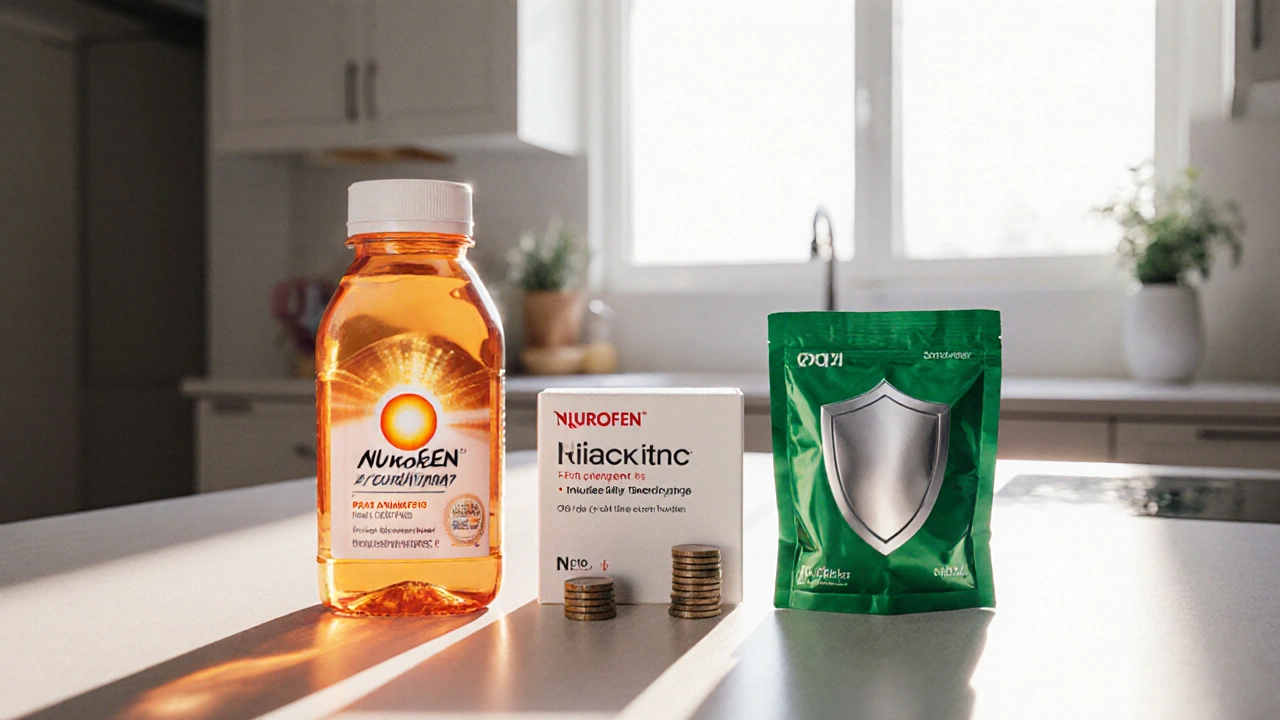
Pain Reliever Selector
Select Your Symptom
Preferred Duration of Relief
Nurofen (Ibuprofen) is a nonsteroidal anti‑inflammatory drug that relieves pain, reduces inflammation, and lowers fever. It’s sold over‑the‑counter in many countries, typically as 200mg tablets.
Quick Take
- For fast‑acting headache relief, Nurofen works in ~30minutes.
- For longer‑lasting arthritis pain, Aleve (naproxen) lasts up to 12hours.
- Acetaminophen (Tylenol) is gentler on the stomach but doesn’t reduce inflammation.
- Low‑dose aspirin is best for heart‑health protection, not everyday pain.
- Cost varies: generic ibuprofen is cheapest; branded Nurofen costs a bit more.
Why Ibuprofen Is a Popular Choice
Ibuprofen blocks the COX‑1 and COX‑2 enzymes that produce prostaglandins-the chemicals that signal pain and swelling. By cutting that signal, you get both pain relief and reduced swelling. That dual action is why you’ll see ibuprofen in everything from simple headache tablets to sports‑injury gels.
Key Alternatives on the Market
When you search for "pain reliever" you’ll quickly run into a handful of names that claim similar benefits. Below are the most common competitors and what makes each unique.
Advil is another brand of ibuprofen, usually sold in 200mg or 400mg tablets. Its formulation is identical to Nurofen, but the branding and price point differ.
Motrin (ibuprofen) targets children and adults alike, often found in liquid suspension for kids.
Aleve contains naproxen, a longer‑acting NSAID that can provide relief for up to 12hours with a single dose.
Tylenol (Acetaminophen) works by acting on the brain’s pain pathways. It eases pain but does not tackle inflammation.
Aspirin (Acetylsalicylic acid) is the original NSAID. Low doses are used for cardiovascular protection, while higher doses treat pain.
Side‑Effect Snapshot
- Ibuprofen (Nurofen, Advil, Motrin): stomach irritation, possible kidney strain, increased blood‑pressure risk.
- Naproxen (Aleve): similar GI upset but a slightly lower impact on blood pressure.
- Acetaminophen (Tylenol): rare stomach issues, but high doses can cause liver toxicity.
- Aspirin: GI bleeding risk, not ideal for children with viral infections.

Cost Comparison (US Retail, 2025)
| Brand | Active Ingredient | Typical Adult Dose | Onset | Duration | Avg. Price (USD) |
|---|---|---|---|---|---|
| Nurofen | Ibuprofen 200mg | 200mg (1 tablet) | 30min | 4-6hr | $0.25 |
| Advil | Ibuprofen 200mg | 200mg | 30min | 4-6hr | $0.22 |
| Motrin | Ibuprofen 200mg | 200mg | 30min | 4-6hr | $0.20 |
| Aleve | Naproxen 220mg | 220mg | 45min | 8-12hr | $0.30 |
| Tylenol | Acetaminophen 500mg | 500mg (2 caplets) | 30-45min | 3-4hr | $0.18 |
| Aspirin | Acetylsalicylic acid 325mg | 325mg | 30min | 4-6hr | $0.12 |
Choosing the Right Product for Your Situation
- Sudden headache or fever: Nurofen or Advil give quick relief and are easy on the stomach when taken with food.
- Joint or muscle pain lasting a full day: Aleve’s 12‑hour action means fewer pills and steadier comfort.
- Kids under 12: Opt for liquid Motrin or a pediatric ibuprofen formulation; avoid aspirin.
- Back‑pain that’s also inflamed: Combine ibuprofen with a heat pack; ibuprofen’s anti‑inflammatory edge helps the swelling.
- Concerned about liver health: Skip Tylenol if you already have alcohol use or liver disease; stick with ibuprofen or naproxen under doctor guidance.
- Cardiovascular risk: Low‑dose aspirin may be prescribed, but for regular aches stick with ibuprofen and monitor blood pressure.
Safety Tips & Common Pitfalls
Even over‑the‑counter meds can cause trouble if misused. Here are the top mistakes and how to avoid them:
- Exceeding 1,200mg of ibuprofen per day without a doctor’s OK can stress kidneys.
- Taking ibuprofen on an empty stomach raises ulcer risk-always pair with food or milk.
- Mixing alcohol with acetaminophen dramatically raises liver‑damage odds.
- Using aspirin in children with viral infections can trigger Reye’s syndrome-never give aspirin to kids under 18 unless prescribed.
- Switching between different NSAIDs (ibuprofen ↔ naproxen) without a wash‑out period can increase GI bleed chances.
When to See a Healthcare Professional
If you notice any of these red flags, it’s time to call a doctor:
- Pain that lasts longer than a week despite medication.
- Stomach pain, black stools, or vomiting blood.
- Swelling that doesn’t improve or worsens.
- Unexplained fever over 101°F (38.3°C) lasting more than 48hours.
- Kidney‑related symptoms: decreased urine output, swelling in ankles.
Frequently Asked Questions
Can I take Nurofen and Advil together?
No. Both contain ibuprofen, so taking them together just doubles the dose and raises the risk of stomach irritation and kidney stress. If one dose isn’t enough, talk to a doctor about a higher‑strength formulation, not a second brand.
Is Aleve safer for my stomach than ibuprofen?
Alepve (naproxen) is also an NSAID, so it shares similar GI‑risk. Some people find naproxen a little easier on their stomach, but the safest move is to take any NSAID with food and consider a COX‑2‑selective option if you have chronic upset.
What’s the maximum safe daily dose of ibuprofen?
For most adults, 1,200mg (six 200mg tablets) is the OTC limit. Prescription plans can go up to 3,200mg under supervision, but that’s only for short‑term use.
Can I use Tylenol if I’m allergic to ibuprofen?
Yes. Acetaminophen works through a different pathway, so it’s generally safe for people with NSAID allergies. Just watch the total daily amount - 3,000mg is the typical OTC ceiling.
Should I avoid ibuprofen while pregnant?
In the first two trimesters, occasional low‑dose ibuprofen is usually okay, but doctors recommend switching to acetaminophen during the third trimester because of potential impacts on fetal blood flow.





18 Comments
Just use ibuprofen if you’re not sure. Cheap, works, done.
The pharmacokinetic profiles of NSAIDs are often misunderstood. While ibuprofen has a shorter half-life (~2 hours), its COX-1/COX-2 inhibition ratio contributes to its efficacy in acute inflammatory states. Naproxen’s longer half-life (~14 hours) provides sustained prostaglandin suppression, which may reduce dosing frequency but increases cumulative GI exposure risk. Acetaminophen, by contrast, acts centrally via TRPV1 and CB1 modulation-no peripheral anti-inflammatory effect, hence its utility in patients with contraindications to NSAIDs.
Man, I’ve been taking ibuprofen since college for back pain and never had an issue-until I tried to power through a 12-hour shift on an empty stomach. Lesson learned: food or milk, always. Now I keep a banana in my desk drawer just for this. 🍌
It’s fascinating how we’ve normalized pharmaceutical self-medication without ever learning the underlying physiology. We treat pain like a glitch to be erased, not a signal to be understood. Ibuprofen doesn’t heal-it silences. And in doing so, we risk ignoring the root cause: poor posture, chronic stress, inflammation from diet. Maybe the real question isn’t which pill to take-but why we need one at all.
Everyone’s just gonna take ibuprofen like it’s candy, but Tylenol’s the real silent killer. Liver failure doesn’t come with a warning label-it just shows up one day when you’re already in the ER. And don’t even get me started on people mixing it with wine. 😒
so like i took aleve for my knee and it worked great but then i saw the box and it said 12 hours so i thought wow i can sleep through the night but then i woke up at 3am with a stomach ache like someone punched me in the gut so now i just stick with motrin and a sandwich lol
the real truth is nobody cares about prostaglandins until their kidneys start screaming. we just want the pain to go away and the cheapest thing on the shelf. ibuprofen is the people’s choice. capitalism in a pill 🤷♂️
I used to take aspirin for headaches until I read about Reye’s syndrome and realized I’d been giving it to my teen nephew after he had the flu. I switched to acetaminophen immediately. It’s scary how many people don’t know the risks. Small changes can save lives.
Let’s be real-this whole discussion is a symptom of our broken healthcare system. Why are we left to navigate complex pharmacology on our own? Why is the only advice we get from pharmacies a smiling cashier handing us a box labeled ‘for occasional use’? We’re not pharmacists. We’re not doctors. We’re just tired people trying to get through the day. And yet we’re expected to make life-or-death decisions based on a 300-word article and a price tag. This isn’t empowerment-it’s negligence dressed up as autonomy. And don’t even get me started on how Big Pharma markets ‘brand superiority’ when the active ingredient is identical across three brands. Nurofen? It’s just ibuprofen with better packaging and a higher profit margin. We’ve been sold a lie wrapped in a blue box.
Okay but have you ever actually read the fine print on Aleve? It says ‘may increase risk of heart attack or stroke’… in like 8-point font under ‘warnings’… and then they put a picture of a runner on the front like it’s a fitness supplement?? This is manipulation. I’m not taking anything with a warning label that’s smaller than the product name. Also-why is aspirin cheaper than water? Someone’s making bank on our ignorance.
Can someone explain why Tylenol is fine for kids but not ibuprofen? I thought ibuprofen was the go-to for fever? 🤔
It is a demonstrable fact that the majority of consumers lack the cognitive capacity to comprehend the pharmacological distinctions between COX-1 and COX-2 inhibition. The prevalence of polypharmacy and concurrent alcohol use with acetaminophen is not merely a behavioral issue-it is a public health crisis rooted in systemic educational failure. One must conclude that the OTC model for NSAIDs is inherently flawed and should be reclassified as prescription-only.
Did you know that ibuprofen can interfere with the body’s natural healing response? It’s not just masking pain-it’s slowing down tissue repair. And no one talks about how the FDA approves these drugs based on short-term studies. What happens after 6 months of daily use? Nobody knows. Big Pharma doesn’t want you to know.
I took 3 Advil last night because my back was killing me. Now I feel like I’m going to throw up and my stomach burns. Why is this always happening to me? I just wanted to sleep. Why does everything hurt so much? Nobody understands.
They told us ibuprofen was safe. They told us aspirin was for the heart. They told us Tylenol was gentle. But the truth? All of them are slowly killing us. The liver, the kidneys, the gut-they’re all under silent siege. And who profits? The same companies that sell you the pills and then the antacids and then the kidney tests. This isn’t medicine. It’s a cycle. A trap. And you’re all just walking right into it. Wake up.
In India, we use paracetamol for everything-headaches, fevers, even menstrual cramps. Ibuprofen is seen as ‘Western’ and too harsh. But here’s the thing: when you’re in a village with no doctor, you take what’s available. No brand names. Just powder in water. And somehow, people survive. Maybe the real lesson isn’t which pill to choose-but how to live with less reliance on pills at all.
Love this breakdown! Seriously, so many people don’t realize Motrin and Advil are literally the same as Nurofen. I always buy the generic ibuprofen in bulk-it’s like 8 cents a pill. And yeah, always eat first. I keep peanut butter crackers in my car now. 🙌
if you're taking aleve for more than a week you're doing it wrong and if you're mixing tylenol with whiskey you deserve what you get and as for nurofen vs advil who even cares it's the same damn chemical stop paying for branding and get your life together